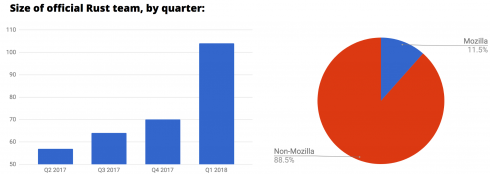
This week the Rust systems programming language is celebrating its third birthday. The community released the 1.0 version on May 15, 2015.
Since the beginning, the Mozilla-backed programming language Rust was designed with a focus on safety, speed and concurrency. Today, it features: zero-cost abstractions, move semantics, memory safety, threads without data races, trait-based generics, pattern matching, type inference, minimal runtime and C bindings.
“Rust is now used in a huge variety of companies, including both newcomers and big names like Google, Facebook, Twitter, Dropbox, Microsoft, Red Hat, npm and, of course, Mozilla; it’s also in the top 15 languages this year on GitHub. As a byproduct, more and more developers are being paid to contribute back to Rust, many of them full time. As of today, Mozilla employees make up only 11 percent of the official Rust teams, and just under half of the total number of people paid to work on Rust,” Aaron Turon, a Rust team member at Mozilla, wrote in a blog.
Over the last year, the official teams overseeing the project have doubled in size, and there are more than a hundred users associated with one or more teams. “To accommodate this scale, the team structure itself has evolved. We have top-level teams covering the language, library ecosystem, developer tooling, documentation, community, and project operations. Nested within these are dozens of subteams and working groups focused on specific topics,” Turon explained.
In addition, the community has worked on inclusivity with Rust Reach and RustBridge, and has provided structured mentoring and invested documentation.
Going forward, the team plans to launch in new continents and work towards internationalization.
The language itself has grown over the years to provide more productivity. This year, the team is planning a major release called the Rust 2018 Edition. “The release will bring together improvements in every area of the project, polished into a new ‘edition’’ that bundles the changes together with updated documentation and onboarding,” wrote Turon.
The language is expected to get stable SIMD support, procedural macros, custom allocators, lifetime system improvements and async/await.
Rust 2018 will also focus on embedded devices, command-line, the browser, node.js. Portable embedding via WebAssembly, and networking services.








